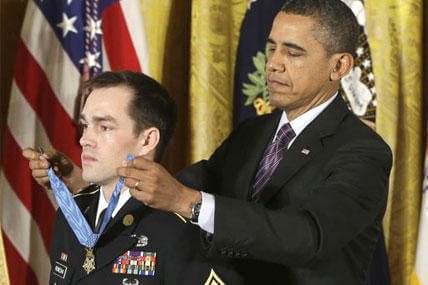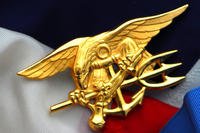Former Army Staff Sgt. Clinton Romesha recounts a surreal moment that came near the bloody end to the 12-hour firefight in which he was to earn the Medal of Honor, the nation’s highest award for valor.
“Just one of those things, you can’t really explain it,” Romesha said. He had stopped at the gate to Combat Outpost Keating after leading the defenders on Oct. 3, 2009, in the close-up battle to repel the well-planned assault by the Taliban to overrun the base.
Sgt. Brad Larson (now 1st Lt. Larson), his best buddy, came running up with a six-pack of Dr. Pepper, a favorite of Romesha’s “Red” platoon. Romesha, Larson, and Sgt. Thomas “Raz” Rasmussen chugged down the soda.
“I thought: ‘Let’s just take a pause and get that Dr. Pepper,’” he said while laughing. “Who thinks of taking a break in a firefight and drinking a soda? Warmest Dr. Pepper you could ever imagine. But man, it was good."
Then he and his men went back to the fight.
Last week, at a ceremony in the North Dakota State Capitol in Bismarck to honor Romesha, Gov. Jack Dalrymple, R-N.D., presented the fourth and latest living recipient of the Medal of Honor from the wars in Iraq and Afghanistan with a bottle of his battle drink. Dalrymple told Romesha that the bottle was intentionally kept at room temperature, and Romesha said that’s the way he liked it.
Romesha has sat down with David Letterman on CBS and had countless microphones stuck in his face since President Obama draped the Medal of Honor around his shoulders at the White House on Feb. 11. However, he said in an interview last Friday with Military.com that the honor comes with a haunting burden.
“You wonder – why me?” he said. “You think about all the ones who didn’t come back. You think about all the great heroes there were that day, so why me?”
The names of the fallen at COP Keating are forever burned into his memory: Sgt. Justin T. Gallegos, Spec. Christopher T. Griffin, Sgt. Joshua M. Hardt, Sgt. Joshua J. Kirk, Spec. Stephen L. Mace, Staff Sgt. Vernon W. Martin, Sgt. Michael P. Scusa, and PFC Kevin C. Thomson.
Romesha credited Army Sgt. 1st Class Leroy Petry with helping him cope with the new responsibility that comes with entry into an elite fraternity – those who wear the “Blue Max.”
Petry lost his right hand throwing back an enemy grenade in battle with D Company, 2nd Battalion, 75th Ranger Regiment in Afghanistan’s Paktia province on May 26, 2008. He was awarded the Medal of Honor by President Obama on July 12, 2011.
Petry attended the White House ceremony for Romesha and they’ve spoken several times since, Romesha said.
“I picked his brain,” Romesha said.
Petry told Romesha he would be “singled out, but you’re wearing it for all soldiers.”
“It’s for them,” Petry said to Romesha.
Petry also advised him against trying to do too much with the status that the Medal brings.
“Understand, you can say no to stuff,” Petry told Romesha. “Don’t think you have to save everybody.”
“I tell you, it’s awesome knowing you can pick up a phone and talk to them,” Romesha said of Petry and others who have earned the Medal.
Eight other soldiers from his unit were awarded the Silver Star shortly after the battle for COP Keating but Romesha said he “never gave a heartbeat of attention to what was going on with the award system.”
“It wasn’t something I was paying attention to. We’d had a pretty hard day but we still had nine months to do” in Afghanistan,” Romesha said.
Last November, “I’d gotten a call from the Pentagon saying a senior official would be calling, and then in December it was President Obama on the end of line,” Romesha said.
Romesha said he was too stunned to remember much of the conversation but “in talking to [Obama], I tried to tell him it wasn’t just me that day, there were so many great heroes that day.”At the White House ceremony, Obama appeared to whisper something as he pinned the Medal to Romesha, but Romesha said he doesn’t remember that either.
“Man, I was too nervous,” Romesha said.
Romesha left the military in April last year, but receiving the Medal of Honor hasn’t given him thoughts of going back after 12 years of service.
“I loved the military. There were days when I didn’t want to do it,” he said of getting out. “I went ahead and just separated. It was time to close a chapter in my life and get back to (his wife) Tammy and the kids (Dessi, Gwen and Colin). I had served basically all my adult life,” from the time he joined the military at age 18, Romesha said.
Romesha said he did his best to prepare for civilian life but the adjustment was difficult.
“It was really scary to make that transition. I utilized the great programs the Army has but there’s no magic wand that makes sure you cover your bases,” he said.
He had noted the experience of other soldiers transitioning out.
‘’Two months to ETS (expiration, term of service) and they have nothing lined up. You have to have a goal to take into the world, especially in this economy,” Romesha said.
He and his wife were from California but his brother-in-law, who was in the energy field, told them there were jobs to be had in the booming oil economy of North Dakota. They settled in Minot, N.D., where Romesha now works as a field safety specialist for an energy company.
He began as an assistant to a truck driver, and then he was managing five trucks and now as a safety specialist he’s employing the organizational skills he learned as a non-commissioned officer.
“Once again you’re in a group where you really have to care about people, the way the Army cares about soldiers. I’m acting like a sergeant again, taking care of soldiers,” Romesha said.
COP Keating and the fierce defense put on by Bravo Troop, 3d Squadron, 61st Cavalry Regiment, 4th Brigade Combat Team, 4th Infantry Division, are always at the back of his mind, but he tries to avoid the what-ifs, Romesha said.
The base in Nuristan province surrounded by the foothills of the Hindu Kush had been deemed “indefensible” by his command, but Romesha said recriminations were pointless.
“We just kind of looked at what we’d been tasked to do” when they arrived at the base, Romesha said. “You’d have to be pretty naïve to think that would be an easy place to defend. We’d talk about how to do it if we were attacking this place,” and the Taliban came at them as he thought they would, Romesha said, but he bore no animosity toward the leaders who placed his unit there.
“You don’t sweat about things you can’t control,” Romesha said. “You just waste your time.”
“I’ll give them credit,” Romesha said of the Taliban. “They weren’t some cave dwellers. They were true professionals” in their coordinated attack, he said. “They just weren’t as good as we were. That was our home, and they weren’t going to get it.”





























